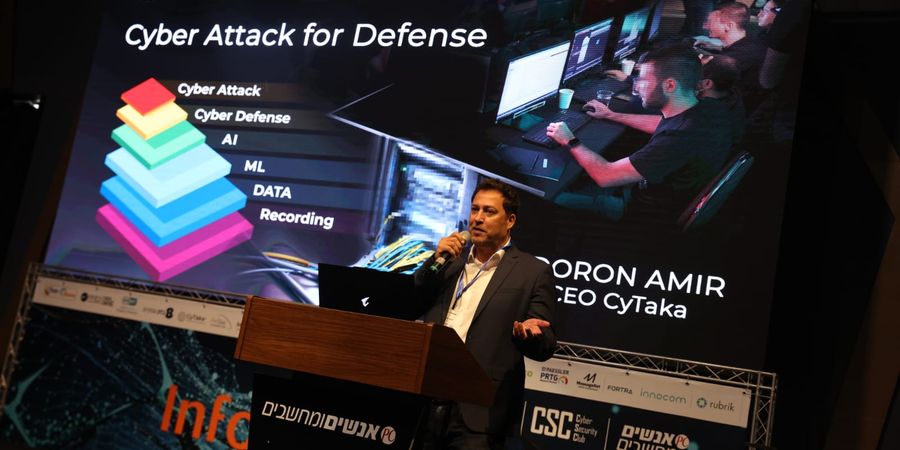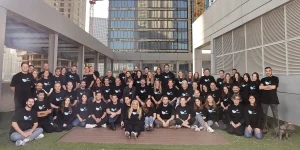ForbesPro
Doron Amir, CEO of CyTaka (the World Cyber Championship), unveiled today at the annual cyber conference InfoSec the next thing in cyber technology: a machine that integrates artificial intelligence (AI) that will enable creating simulations of new cyberattacks and could be used to train cyber professionals.
Amir cautions: “The age of machines is underway. We must expedite the race to quantum computing, otherwise the machines might rise up against their creators. This could happen as today’s computers are not protected in a way that can cope with machines equipped with AI.
“If quantum computing is not functional in the next few years, we will see AI-based cyberattacks against which we will not be able to defend ourselves using existing technology in the civilian and business markets. Such cyberattacks could make much more damage than anything we now know, including the harming human life due to the use of smart technology in our vehicles, aviation and health industries”.
Fluid and Crystalized Intelligence in AI
Amir recounts that a couple of years ago, when his company started to develop a machine that could simulate cyberattacks for the purpose of training cyber professionals, they discovered that their work was cut out for them, and that it was more complex than they initially thought.

“The first version showed us by the results that the machine behaved with crystalized intelligence (it could only cope with problems it had previously encountered or that were similar to patterns it was already familiar with).
Actually, the new generation of Cyber Security needs to understand and be ready to handle new cyber security cases which never happened before. This is why we developed the fluid intelligence module to our machine. (Giving us the ability to cope with new problems),” explains Amir. “Unlike humans, who lose their fluid intelligence as they grow older, the machine has no biological limitations, and therefore, its fluid intelligence gets better over time, as its computing power continues to increase”.
‘Moore’s Intelligence’ is a term that Amir coined based on Moore’s Law. According to Amir, there is direct correlation between computational power and fluid intelligence in the world of AI. “In order to simulate fluid intelligence, we engaged young people whose fluid intelligence is at its peak, who work in the fields of software, information security and cyber. The idea was to identify people who have a proven record in dealing with new security problems. We met these hackers at the cyber championships held around the world, where we witnessed the very best minds solving cyber challenges using various methodologies and tactics.
After studying these methodologies and tactics, we found they were different from one hacker to the next and that hackers from different countries cope with the same cyber challenges differently, both in terms of offense and defense.
“As we could not find a fluid intelligence cyber module, we created our own module by gathering data and techniques from all around the world. We held cyber competitions in Israel, USA and of course, the World Cyber Championship was held in United Arab Emirates (UAE), which allowed us to host cyber professionals from countries that do not have diplomatic relations with Israel”.

Amir says that the main challenge in the final round of the World Cyber Championship produced by CyTaka in Dubai, was to hack a drone located in Israel, manipulate it to take a photograph from the air of a secret code positioned in a hidden place, and then to send this code back to the Competition Judges on the main stage in GISEC Global in Dubai. The event was held in partnership with the Cyber Security Council (UAE) together with the respectful H.E. Dr. Mohamed Al Kuwaiti (Head of Cyber Security UAE Govt).
Only after an hour, (when the allotted time and the time extensions were over) a professional hacker from Tunisia completed the mission. “In comparison, our machine managed to solve the challenge in under 7 minutes,” says Amir enthusiastically.
‘Terminator’ comes to life
“Today, competitors in our cyber championships can use our machine to practice before the competition starts. In the near future, we will hold cyber competitions where not only machines compete against human hackers, but against other machines”.
Amir notes that there is room for concern, as there is no doubt that the machines will beat the humans. He says that the only way to control the situation is with a game changer like the quantum computer, which could definitely be a crucial instrument in defense and thwarting cyberattacks.
“The quantum computer already exists in terms of feasibility, and one can travel to Singapore for a demonstration (if you get invited to see this wonder). One of the problems today putting the computer to use in the industry is the tremendous amount of energy required to cool the system to -273° Celsius (the absolute zero -273.15° C).
“The solution to the extreme temperature requirements might be found in the ability to use the space platform, where the required temperature can occur naturally”.
“I have a great suggestion for Elon Musk” says Amir. “The space infrastructure he is building might very well be better suited for cooling quantum computers rather than for space tourism”.
ForbesPro is Forbes’s Marketing content brand





